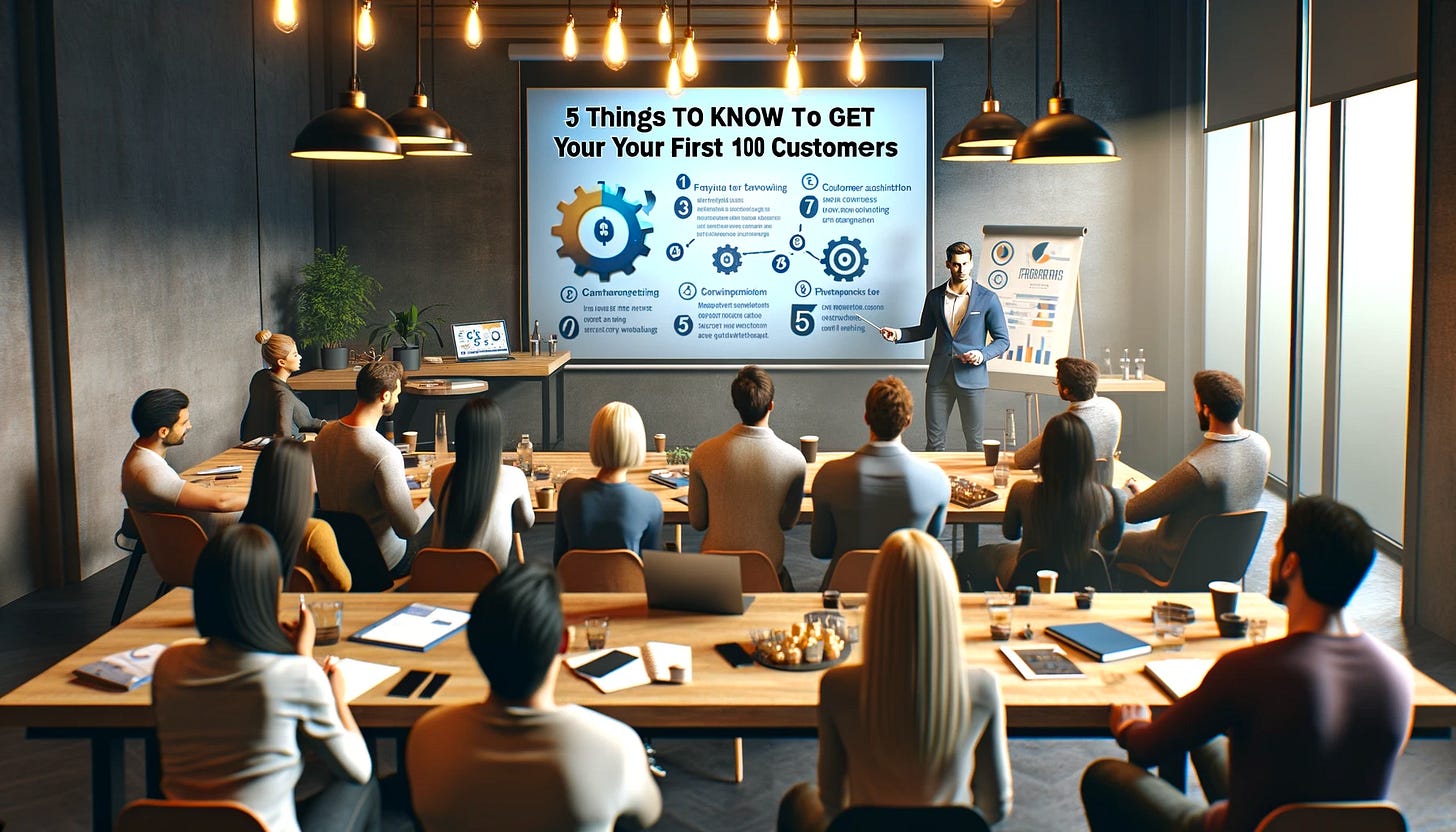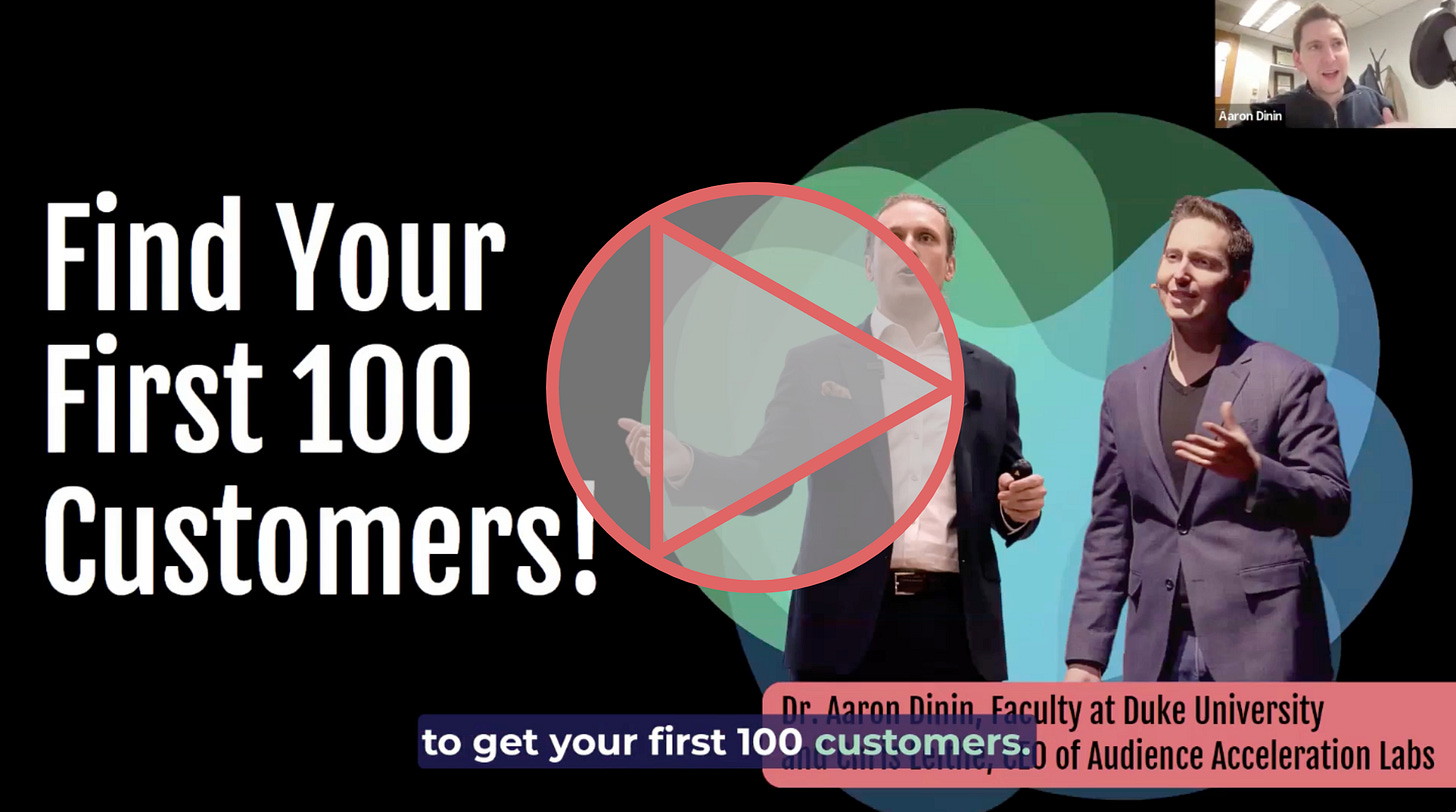5 Things to Know to Get Your First 100 Customers
Entrepreneur Office Hours - Issue #216
Had a fantastic turnout for this week’s live classes explaining how to get your first 100 customers. As one attendee in the chat wrote: “Best, quickest sales talk in a long time...straight to the point. Thank you. I now understand my task 😊”
I’ll take that review!
To those of you who attended, a huge thanks for coming! Also, I need to give an equally huge thanks to Chris Leithe, CEO of Audience Acceleration Labs, for taking the time to share his insights.
If you missed the sessions (or if you just want another chance to review everything), here’s a recording:
The 5 main topics covered include:
Cultivating a sales mindset
Leveraging your network
Inbound lead generation
Outbound lead generation
Best sales tools
As I said during the sessions, there is an epidemic of rampant procrastination among entrepreneurs when it comes to customer acquisition. They always have "one more feature to add” or “one last bug to fix” before they start focusing on sales and marketing.
But customer acquisition isn't the thing you do once you've built an awesome product. Investors, acquirers, your bank account... none of them care about your product and features. They all care about your customer acquisition process. Your customer acquisition process is the heart of your company. It's the valuable thing you're building!
Setting up a comprehensive customer acquisition process takes time, but the steps are all outlined in the linked video.
Also, since lots of people have been asking for help setting up their individual sales processes, I’ve asked Chris to help me teach a live, five week workshop. You can find more info toward the end of the linked above, and you can also find details and a registration form here.
The sessions start February 22nd, so make sure you claim your spot ASAP.
-Aaron
P.S. Unfortunately, the full workshop can’t be free, but, if you can afford it and you’re at the stage where you need help, spend the money. It’ll save you a year of work, and that saved year is well worth the cost.
At the same time, my goal with the workshop isn’t to get rich. My goal, as always here, is to provide value for this incredible community. If the price point isn't something you can swing, reply to this email, explain what you’re working on, and let’s talk.
In other words, don't let the cost be your blocker. Your time is more valuable than money.
This week’s new articles…
How I Teach Thousands of Entrepreneurs the Key Ingredient to Entrepreneurial Success
The formula for being a successful entrepreneur may not be nearly as complex as you’ve been thinking.
Dear Entrepreneurs: Don’t Forget that Apple’s Vision Pro Is Creating Enormous Opportunities
In celebration of the launch of Apple’s new Vision Pro headset (which should be happening as this issue is being published), here’s an entrepreneurial take on what to be excited about.
Office Hours Q&A
———————
We got lots of great questions during this week’s “How to Get Your First 100 Customers” webinar. I figured I’d use this issue’s Q&A as an opportunity to share thoughts on some of them…
Q: I find that people like to do what's popular. Feeling like they're in a club or community. So, what are recommendations on how to expand to that mindset? - Kim
This question is absolutely spot-on in terms of understanding sales psychology. People prefer to do what everyone else is doing (it’s a form of validation), which means clever entrepreneurs should be doing whatever they can to make their products seem in-demand (even if they aren’t).
This is a perfect job for social media. Social media isn’t just about building awareness. It’s also about making people feel like lots of other people know about and use your product.
In other words, if you want people feeling like your product is popular, start making sure they see it everywhere. And you can do that most easily by leveraging platforms like TikTok, Instagram, LinkedIn, etc.
Q: What if there is no overlap between your target customers and your network? - Yoram
To provide a bit of context, I’ll mention that one section of the webinar focused on leveraging your network to identify early potential customers. The logical question that follows is what’s being asked here: What if people in your network aren’t good potential customers?.
The thing about leveraging your network is that it doesn’t just mean trying to get your network to buy. In fact, trying to strongarm people in your networks into becoming customers isn’t usually a good idea. It’s often more an indicator of pity than demand.
But your network has networks, and it’s those people you really want to reach. Who in your network knows someone that could be a customer? Figure that out (using tools like LinkedIn), and then use your network to get introduced.
Q: I’m in B2B enterprise sales and I often set up the meeting as more of “I’m looking for feedback on what we’re doing” vs I want to sell you something. In the course of getting that feedback we get to talk about the product and what it could do for them. - Debi
This wasn’t technically a question, but it was a statement someone made, and I wanted to take a moment to think through it.
I certainly agree with the value of setting up conversations to learn, particularly in the early days of a startup. And, yes, sometimes these conversations can eventually lead to sales. But, getting serious about sales and customer acquisition means being direct about the fact that, yes, you’re selling something.
The reason entrepreneurs try subtle tactics like “having conversations” is because it’s easier to get someone to agree to a conversation than a sales pitch. But be careful not to mistake easiness for meaningful value. In sales, it’s better to be direct with what you’re selling and get a quick “no” than to try to be sneaky. Being sneaky almost always leads to the same “no,” it just ends up taking a lot more time.
Got startup questions of your own? Reply to this email with whatever you want to know, and I’ll do my best to answer!







